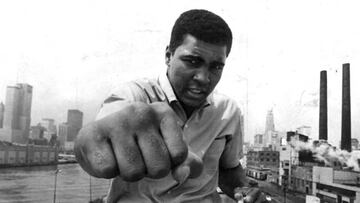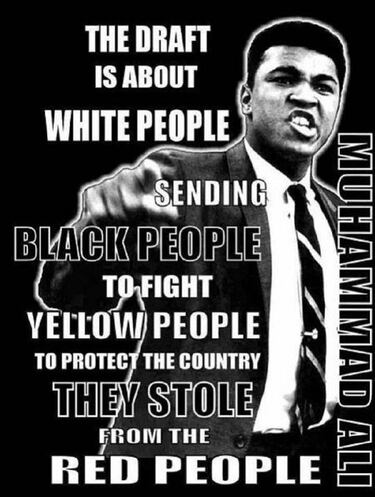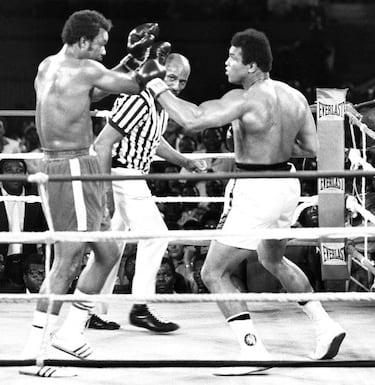Muhammad Ali boxing legend has died in Phoenix
The legendary boxer Muhammad Ali has died at 74 years of age, as confirmed by a family spokesperson, unable to overcome severe respiratory problems he was suffering from.

The greatest boxer of all time for many and a near-mythical sports personality, Muhammad Ali transcended social and political boundaries to become a symbol for change, a voice for a powerful drive for racial equality in a convulsive 60's United States, and made a personal stand against the Vietnam war that resounded with an entire generation.
Ali's achievements reach far beyond the ropes of the ring, contributing to social, racial, and ideological changes in the deeply divided U.S. of the 60's and 70's, he found himself at the epicentre of rapidly evolving sociocultural dynamic which he helped to shape.
In the same way Jesse Owens flew past Hitler in '36, and Tommie Smith lifted a black fist over the civil rights movement in '68, Ali became a counter-cultural icon thanks to the prominence he had as a heavyweight champion, and a wit as quick as his fists, his instantly recognisable 'fly like a butterfly, sting like a bee' his own immortal moniker. He died on Friday June 4, 2016 in Phoenix, Arizona at 74 years of age.
The beginning
The legend began in Louisville Kentucky in 1942, where Ali was born and given the name Cassius Marcellus Clay, jr, a descendant of pre-Civil War era American slaves in Southern United States. At 12 years of age he joined a boxing club because somebody had stolen his bike, a young Clay told the officer he was going to "whup" the thief, the officer told him he better learn how to box first, and he did, quickly rising to prominence as a talented young fighter. He won six Kentucky Golden Gloves titles, two national Golden Gloves titles and an Amateur Athletic Union National Title. Clay's amateur record reads: 100 wins, five losses.
The Olympics
Then came the 1960 Summer Olympics in Rome, at just 18 years of age Cassius Clay won the Light Heavyweight gold medal beating the Pole Zbigniew Pietrzykowski in the final. The professional world of boxing sat up and took note of the quickest fighter in the tournament and he was taken under the wing of Angelo Dundee, moving to Miami from Louisville. His professional career began with five consecutive knockouts.
The professional
By 1962 Clay was a household name in boxing, this was the year, however, of his first professional defeat in Madison Square Garden against Sonny Banks, losing on a technical knockout. Nevertheless, Clay's star was on the rise and by the end of 1963 he had a record of 19–0 with 15 wins by knockout, but still wasn't facing the top contenders due to his unorthodox style and undiscovered star quality.
His first great fight on a grand scale came against Sonny Liston, Clay was the main contender for Liston's heavyweight title. Liston cut an intimidating figure with his New York mob connections, which made Ali's pre-fight patter all the more daring, he called Liston a "big ugly bear" and said "After I beat him I'm going to donate him to the zoo".
Clay won a difficult fight, in which the famous 'phantom punch' was thrown, some believing that the mob had fixed it, but Clay was the first to cut Liston in the ring and the reigning champ couldn't contain his superior speed and footwork. Liston claimed he didn't answer the bell in the 7th round because of a shoulder injury, the fight recorded as a TKO in Clay's favour.

Muhammad Ali
Related stories
A rematch was set and between the two fights Cassius Clay became Muhammad Ali, in honour of the leader of the Nation of Islam, Elijah Muhammad.
This nominative transformation caused great controversy in the context of a U.S. torn along the lines of racial and political differences, a climate of fear and suspicion propagated by the assassination of JFK and even more so by that of the black civil rights leader Malcolm X. A prominent black sports star taking on an African name and embracing Islam had a profound impact on a society still trying to wake up from the nighmare of slavery.
When the U.S army tried to draft Ali to fight in the Vietnam war, he refused, famously saying; "No Vietcong ever called me nigger". He was stripped of his boxing licence and lost three years of a career in its prime.
Back in the ring
In 1971 Ali was back on familiar ground in the ring against Joe Frazier in Madison Garden, Ali's pre-fight antics as entertaining as ever; "Frazier is too ugly to be champ". Ali lost one of the bloodiest battles in the collective boxing memory by unanimous decision, both men hospitalized afterwards.
In 1974 Ali had his revenge against Frazier and in the same year fought in possibly the single most famous boxing event of all time: The "Rumble in the Jungle" against George Foreman. In the most celebrated fight in African boxing history in Kinshasa, Zaire, the fight brought together 60,000 spectators, James Brown, B.B. King, and a host of prominent black names who saw it as a chance to rediscover their Afican roots.

With Foreman a clear favourite, Ali leant back, figuratively and literally, on a 'rope-a-dope' strategy, taunting Foreman to keep hitting him, working the title holder into a rage, expending energy and tiring himself our before Ali struck late in the fight to win back the heavyweight crown.
Defeats in 180 to Larry Holmes and Trevor Berbick in 1981 led to Ali's definitive goodbye to boxing, it also coincided with the diagnosis of Parkinsons, a debilitating disease probably inoculated in the ring that Ali lived with until the day he died. Muhammad Ali will forever be an inspiration, and for many " The Greatest of all Time".
Reaction and tributes to the passing of Muhammad Ali
THE GREATEST IS GONE https://t.co/otJWCVFlba vía @wbcboxing pic.twitter.com/knVPEEjk2L
— World Boxing Council (@WBCBoxing) June 4, 2016
LEGENDS WILL NEVER DIE !!!
— World Boxing Council (@WBCBoxing) June 4, 2016
"But your soul and your spirit never die, that's gonna live forever."
Muhammad Ali pic.twitter.com/3R3AJflqxR
Float like a butterfly, sting like a bee. pic.twitter.com/dQsDdbqJGw
— NFL (@NFL) June 4, 2016
Rest easy, Champ. https://t.co/p5aeQUhyC6
— MLB (@MLB) June 4, 2016
Forever A Champion | #TheGreatestOfAllTime pic.twitter.com/eoJI7RMu2W
— UFC (@ufc) June 4, 2016
God came for his champion. So long great one. @MuhammadAli #TheGreatest #RIP pic.twitter.com/jhXyqOuabi
— Mike Tyson (@MikeTyson) June 4, 2016
My idol has left us. I will always remember you as the best & will follow ur example. Your legend will live forever pic.twitter.com/v9X8Y3S6Xk
— Canelo Alvarez (@Canelo) June 4, 2016
A giant among men, Ali displayed a greatness in talent, courage & conviction, that most of us will EVER be able to truly comprehend. #RIPAli
— Lennox Lewis, CBE, CM (@LennoxLewis) June 4, 2016
— Julio César Chávez (@Jcchavez115) June 4, 2016
Until Ali no one said "I'm beautiful" he was royalty, yet common man was his pal. That is beauty. Greatest kind pic.twitter.com/uX7htKHrGc
— George Foreman (@GeorgeForeman) June 4, 2016
Ali on how he'd like to be remembered, from his 2004 memoir "The Soul of a Butterfly, Reflection on Life's Journey." pic.twitter.com/3ldnXNhLgF
— ESPN (@espn) June 4, 2016
